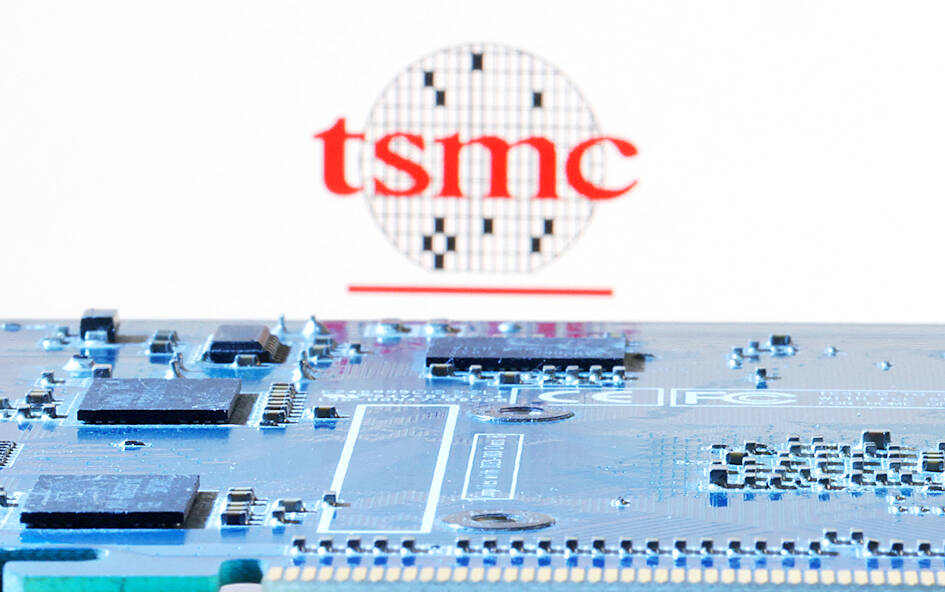Taiwan Semiconductor Manufacturing Co (TSMC, 台積電) said yesterday it was still considering venue options for its new advanced wafer fab, contrary to a local media report earlier in the day that the chipmaker was planning to build a 1-nanometer wafer plant in Chiayi County.
While the world’s largest contract chipmaker did not directly comment on the matter of Chiayi as a potential location, TSMC said in a statement that the company would need to consider all factors before making a final decision on where to build the 1-nanometer fab.
The Chinese-language Economic Daily News cited unnamed sources as saying that TSMC had submitted an application to the authorities supervising the Chiayi section of the Southern Taiwan Science Park (南部科學園區) for 100 hectares of land so it could expand operations.

Photo: Dado Ruvic, Reuters
The report said TSMC was expected to use 60 of the 100-hectare parcel to build a 1-nanometer fab, while the remaining 40 hectares were to be used to set up an advanced IC packaging and testing plant to provide a one-stop service for its clients.
It is estimated that TSMC would spend more than NT$1 trillion (US$31.89 billion) in its 1-nanometer process development, the report said.
In the statement, TSMC said that Taiwan is the hub for the chipmaker’s worldwide expansion.
TSMC added that it was not ruling out any potential venue and that it would continue working with science park authorities to choose a location for the investment.
However, the chipmaker did not specify whether the authorities it was in discussions with were the Southern Taiwan Science Park, the Central Taiwan Science Park (中部科學園區) or the Hsinchu Science Park (新竹科學園區).
Last month, Taichung Mayor Lu Shiow-yen (盧秀燕) told a Taichung City Council hearing that TSMC would build a fab in the second phase of Central Taiwan Science Park expansion that would use more advanced technology than the 2-nanometer process.
TSMC is building a 2-nanometer fab in Hsinchu County’s Baoshan Township (寶山) with commercial production scheduled to start next year. The 2-nanometer production is to be expanded to Kaohsiung with two fabs planned.
Last week, TSMC said it was evaluating the possibility of building a third 2-nanometer process fab in Kaohsiung following strong demand.

Nvidia Corp chief executive officer Jensen Huang (黃仁勳) on Monday introduced the company’s latest supercomputer platform, featuring six new chips made by Taiwan Semiconductor Manufacturing Co (TSMC, 台積電), saying that it is now “in full production.” “If Vera Rubin is going to be in time for this year, it must be in production by now, and so, today I can tell you that Vera Rubin is in full production,” Huang said during his keynote speech at CES in Las Vegas. The rollout of six concurrent chips for Vera Rubin — the company’s next-generation artificial intelligence (AI) computing platform — marks a strategic

Enhanced tax credits that have helped reduce the cost of health insurance for the vast majority of US Affordable Care Act enrollees expired on Jan.1, cementing higher health costs for millions of Americans at the start of the new year. Democrats forced a 43-day US government shutdown over the issue. Moderate Republicans called for a solution to save their political aspirations this year. US President Donald Trump floated a way out, only to back off after conservative backlash. In the end, no one’s efforts were enough to save the subsidies before their expiration date. A US House of Representatives vote

REVENUE PERFORMANCE: Cloud and network products, and electronic components saw strong increases, while smart consumer electronics and computing products fell Hon Hai Precision Industry Co (鴻海精密) yesterday posted 26.51 percent quarterly growth in revenue for last quarter to NT$2.6 trillion (US$82.44 billion), the strongest on record for the period and above expectations, but the company forecast a slight revenue dip this quarter due to seasonal factors. On an annual basis, revenue last quarter grew 22.07 percent, the company said. Analysts on average estimated about NT$2.4 trillion increase. Hon Hai, which assembles servers for Nvidia Corp and iPhones for Apple Inc, is expanding its capacity in the US, adding artificial intelligence (AI) server production in Wisconsin and Texas, where it operates established campuses. This

US President Donald Trump on Friday blocked US photonics firm HieFo Corp’s US$3 million acquisition of assets in New Jersey-based aerospace and defense specialist Emcore Corp, citing national security and China-related concerns. In an order released by the White House, Trump said HieFo was “controlled by a citizen of the People’s Republic of China” and that its 2024 acquisition of Emcore’s businesses led the US president to believe that it might “take action that threatens to impair the national security of the United States.” The order did not name the person or detail Trump’s concerns. “The Transaction is hereby prohibited,”